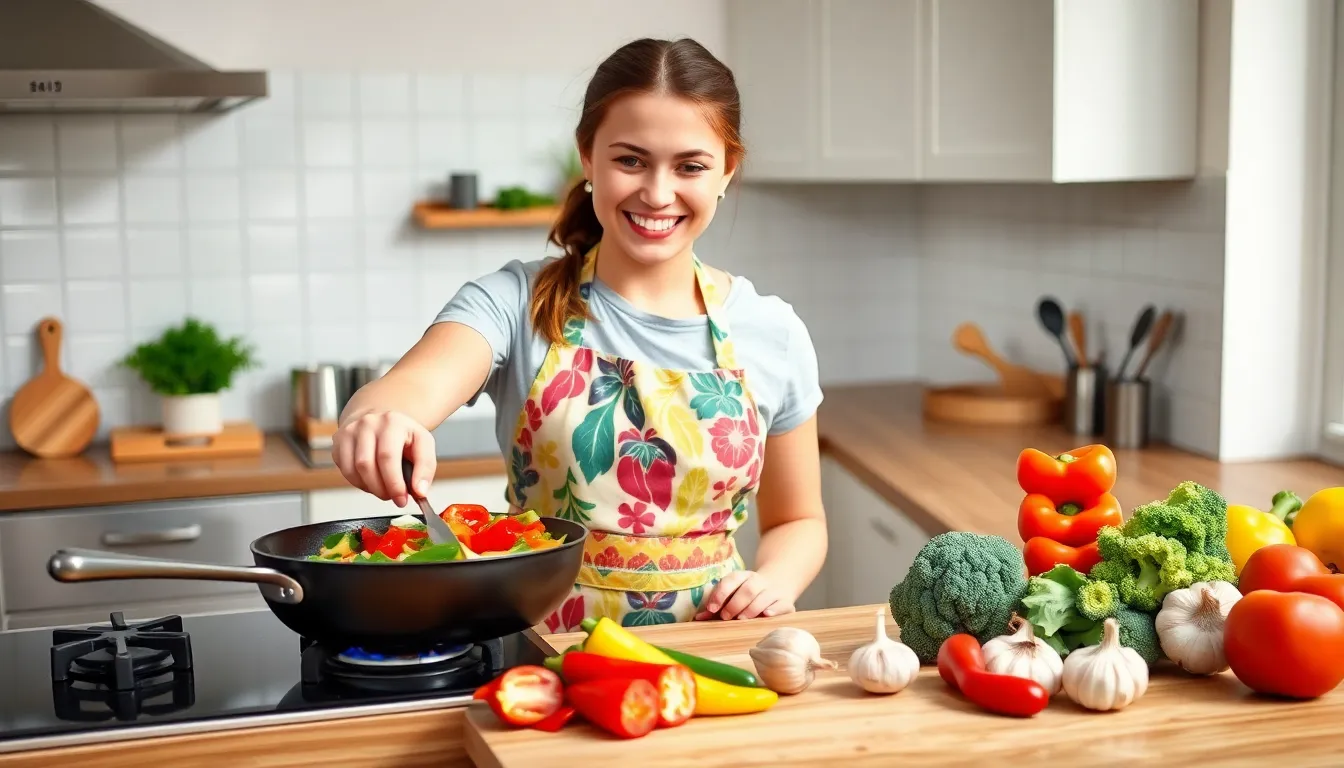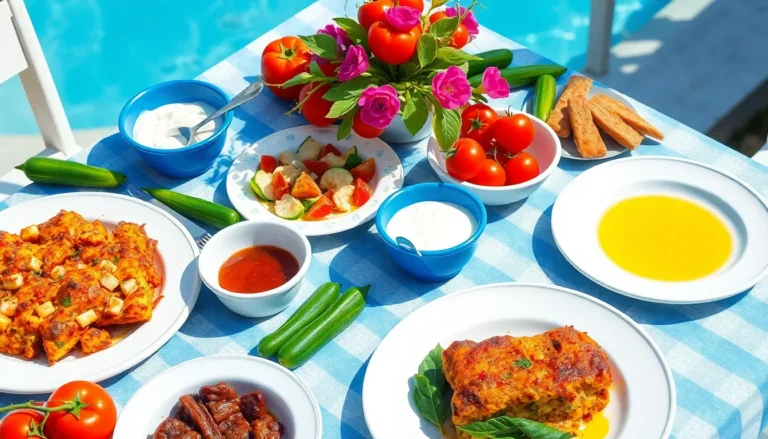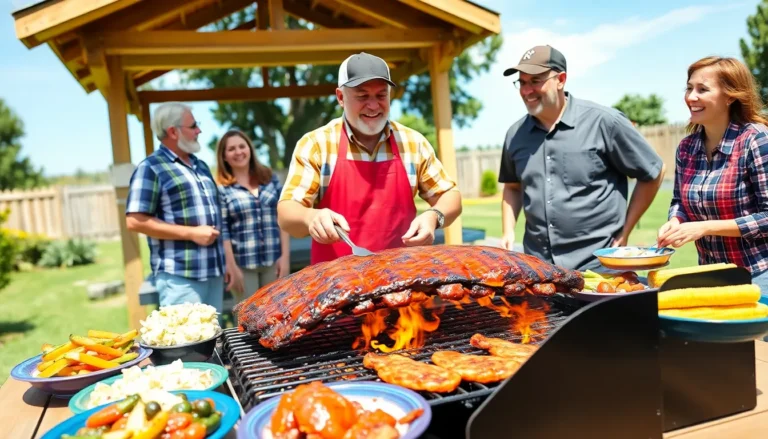Table of Contents
ToggleIn today’s fast-paced world, finding time to prepare healthy meals can feel impossible. Quick recipes offer a solution, transforming the way people approach cooking. With just a few simple ingredients and minimal prep time, anyone can whip up delicious dishes that satisfy cravings and nourish the body.
Whether it’s a busy weekday dinner or a last-minute lunch, quick recipes provide endless possibilities. They cater to various tastes and dietary preferences, making them perfect for families and individuals alike. With the right techniques and a little creativity, anyone can elevate their cooking game without spending hours in the kitchen. Embrace the art of quick cooking and discover how easy it is to enjoy flavorful meals on the go.
Overview of Quick Recipes
Quick recipes provide a straightforward way to prepare meals without sacrificing flavor or nutrition. These dishes typically include five or fewer ingredients, significantly reducing preparation time. Many quick recipes feature cooking methods such as sautéing, grilling, or boiling to enhance flavors quickly.
Different types of quick recipes cater to various dietary needs and preferences. Whether vegetarian, gluten-free, or low-carb, quick recipes can accommodate diverse tastes. Busy families find these recipes invaluable, allowing them to serve meals that everyone enjoys.
Preparation time for quick recipes usually ranges from 15 to 30 minutes. For example, one-pot meals or sheet pan dinners simplify the cooking process while minimizing cleanup. Quick recipes can also incorporate leftovers, making efficient use of available ingredients and reducing waste.
Exploring quick recipes can lead to satisfying meals that support a healthy lifestyle amidst a hectic schedule. By utilizing easy-to-follow steps and minimal time, quick recipes enable anyone to enjoy delicious homemade food without extensive effort.
Benefits of Quick Recipes

Quick recipes offer numerous advantages in today’s fast-paced life. These recipes simplify meal preparation, making it easier for anyone to maintain a healthy and flavorful diet with minimal effort.
Time-Saving Advantages
Quick recipes save significant time in the kitchen. Preparation often takes 15 to 30 minutes, eliminating lengthy cooking processes. Most quick recipes utilize five or fewer ingredients, allowing cooks to streamline grocery shopping and meal prep. One-pot meals and sheet pan dinners further enhance efficiency by minimizing cleanup, enabling cooks to focus on enjoying their meals rather than spending hours in the kitchen.
Healthy Eating Made Easy
Quick recipes facilitate healthy eating choices. By using fresh ingredients and simple cooking techniques, these recipes preserve nutritional value while maximizing flavor. They cater to various dietary preferences, including vegetarian, gluten-free, and low-carb options, accommodating diverse nutritional needs. The inclusion of readily available ingredients helps reduce food waste and encourages the use of leftovers, promoting sustainability in meal planning. These factors collectively make healthy eating more accessible for busy individuals and families.
Types of Quick Recipes
Quick recipes span various meal categories, providing fast and flavorful options for every palate. These recipes cater to breakfast, lunch, dinner, and snacks, each offering simple, time-efficient solutions.
Breakfast
Quick breakfast recipes typically include smoothies, overnight oats, and scrambled eggs. Smoothies can blend fruits, vegetables, and yogurt in under 10 minutes. Overnight oats require combining rolled oats, milk, and toppings the night before, creating a nutritious meal ready in the morning. Scrambled eggs, cooked in a skillet, take about 5 minutes and can pair with vegetables or cheese for added flavor.
Lunch
Quick lunch recipes often feature wraps, salads, and grain bowls. Wraps can include tortillas filled with deli meats, cheese, and veggies for a meal ready in 10 minutes. Salads may combine pre-washed greens, canned beans, and pre-cooked proteins, offering a meal that comes together in under 15 minutes. Grain bowls can include cooked quinoa or rice topped with various vegetables and sauces, allowing for customization and quick assembly.
Dinner
Quick dinner recipes excel in one-pot meals, stir-fries, and sheet pan dishes. One-pot meals often blend proteins, grains, and vegetables, minimizing cleanup while cooking in under 30 minutes. Stir-fries can quickly sauté seasonal vegetables and proteins with sauces for a nutritious meal prepared in 20 minutes. Sheet pan dinners involve arranging meats and veggies on a single pan, roasting them simultaneously, and yielding a full meal ready in about 30 minutes.
Snacks
Quick snack recipes feature energy bites, yogurt parfaits, and vegetable sticks with dip. Energy bites can consist of oats, nut butter, and honey, requiring no baking and taking less than 10 minutes to prepare. Yogurt parfaits layer yogurt with fruits and granola, creating a healthy, satisfying snack within minutes. Vegetable sticks serve with hummus or guacamole, providing a crunchy, nutritious option ready in short order.
Tips for Preparing Quick Recipes
Using efficient strategies can enhance the experience of preparing quick recipes. Optimal kitchen tools and meal prep techniques streamline the cooking process, making it easier to create nutritious dishes quickly.
Essential Kitchen Tools
Equipping the kitchen with essential tools facilitates fast meal preparation. Key tools include:
- Chef’s knife: A sharp, multipurpose knife accelerates vegetable chopping and meal prep.
- Cutting board: A sturdy cutting board provides a safe surface for food preparation.
- Non-stick skillet: A non-stick skillet simplifies cooking dishes like eggs and stir-fries with minimal clean-up.
- Instant pot or pressure cooker: These appliances significantly reduce cooking time for stews and grains.
- Blender: A blender efficiently combines ingredients for smoothies and sauces.
- Measuring cups and spoons: Accurate measurements ensure consistency in recipes.
- Mixing bowls: Various sizes of mixing bowls allow for easy ingredient preparation and mixing.
Meal Prep Strategies
Implementing effective meal prep strategies maximizes efficiency in the kitchen. Consider the following approaches:
- Batch cooking: Prepare larger quantities of meals to store in the fridge or freezer for quick access throughout the week.
- Ingredient organization: Pre-chop vegetables and organize ingredients in containers for easy assembly during cooking.
- Utilize leftovers: Repurpose leftovers from previous meals to create new dishes, saving time and reducing waste.
- Plan weekly menus: Outline quick recipes for the week to streamline grocery shopping and reduce decision fatigue.
- One-pot meals: Focus on recipes that require minimal pots and pans, simplifying both cooking and clean-up.
Employing these tools and strategies transforms quick recipe preparation into an enjoyable, efficient process.
Quick recipes offer a practical solution for anyone looking to prepare healthy meals without spending hours in the kitchen. By embracing these simple yet flavorful dishes, cooks can enjoy a variety of meals that cater to diverse dietary preferences.
With minimal ingredients and efficient cooking methods, quick recipes make it easy to create satisfying meals that fit into a busy lifestyle. Incorporating these techniques not only saves time but also promotes healthier eating habits.
By utilizing essential kitchen tools and smart meal prep strategies, anyone can transform their cooking experience into a more enjoyable and efficient process. Quick recipes are the key to enjoying delicious homemade food with ease.







